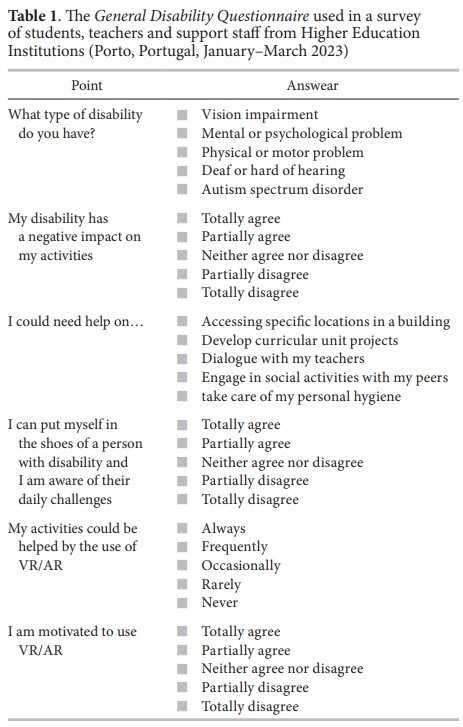Online first
Current issue
Archive
Most cited in 2024
About the Journal
Editorial Office
Editorial Board
Copyright and self-archiving policy
Information clause on the processing of personal data
Declaration of accessibility
Instructions for Authors
Instructions for Reviewers
Contact
Reviewers
2024
2023
2022
2020
2021
2019
2018
2017
2016
2015
2014
2013
Editing and translations
ORIGINAL PAPER
Inclusion and adaptation beyond disability: Using virtual reality to foster empathy
1
Polytechnic Institute of Porto, Porto, Portugal (School of Engineering, Department of Physics)
2
Lodz University of Technology, Łódź, Poland (Institute of Mechatronics and Information Systems)
3
University of Aveiro, Aveiro, Portugal
4
University of Lodz, Łódź, Poland (Institute of Sociology)
Online publication date: 2023-08-25
Corresponding author
Luis Pinto-Coelho
Polytechnic Institute of Porto, School of Engineering, Department of Physics, Rua Dr. António Bernardino de Almeida 431, 4249-015 Porto, Portugal
Polytechnic Institute of Porto, School of Engineering, Department of Physics, Rua Dr. António Bernardino de Almeida 431, 4249-015 Porto, Portugal
Med Pr Work Health Saf. 2023;74(3):171-85
KEYWORDS
TOPICS
ABSTRACT
Background: Virtual reality (VR) has the potential to be a powerful tool in promoting empathy towards inclusion, particularly for individuals with impairments such as mobility difficulties, vision deficits, or autism but also about pregnancy, which can create temporary difficulties. By immersing users in simulated environments that replicate the experiences of those with different abilities, VR can create a sense of understanding and empathy for those who face challenges in their daily lives. For example, VR experiences can simulate the experience of navigating space as someone with a mobility impairment, providing a new perspective and appreciation for the difficulties that others face. Similarly, VR experiences can simulate the experience of vision impairment, pregnancy, or autism, providing a window into the challenges faced by those with these conditions and fostering empathy and understanding. Material and Methods: During the development of this study, field experts were consulted to ensure the robustness of the methods employed. Then, questionnaires were specifically developed to explore disabilities and challenges related to inclusion and were administered to a large population. Additionally, guided interviews were conducted with individuals who possess specific impairments to gather first-hand insights. Results: The results obtained from the questionnaires and interviews provide a comprehensive overview of the inclusion challenges that necessitate attention and resolution. By drawing on the expertise of both experts and individuals with lived experiences, a holistic landscape of inclusion challenges has been established. Conclusions: The VR emerges as a powerful tool for promoting inclusion and fostering understanding among individuals. Its capacity to create immersive experiences that facilitate empathy has the potential to reshape society into a more compassionate and empathetic one. By leveraging the unique capabilities of VR, we can bridge the gap between different perspectives, fostering greater understanding, acceptance, and inclusivity. Med Pr. 2023;74(3):171–85
Share
RELATED ARTICLE
We process personal data collected when visiting the website. The function of obtaining information about users and their behavior is carried out by voluntarily entered information in forms and saving cookies in end devices. Data, including cookies, are used to provide services, improve the user experience and to analyze the traffic in accordance with the Privacy policy. Data are also collected and processed by Google Analytics tool (more).
You can change cookies settings in your browser. Restricted use of cookies in the browser configuration may affect some functionalities of the website.
You can change cookies settings in your browser. Restricted use of cookies in the browser configuration may affect some functionalities of the website.






